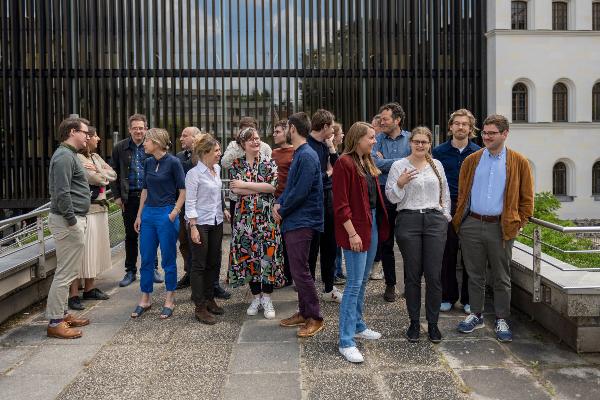The seminar room in the Philologicum branch of LMU University Library is filled to capacity: doctoral researchers, students, and professors from Germany, the United States, the United Kingdom, and Switzerland have congregated in Munich for three days in July. They have come to discuss literary questions on the theme of “Challenging authorship. Hidden networks of the creative process.”
One of the many sessions on offer is titled “Making an Author” and explores this subject through the lens of the first novel by a woman to be published in Germany. The participants tease out how publisher Christoph Martin Wieland tried to anticipate the hefty reactions of the reading public and literary critics that were sure to flare up on publication of The History of Lady Sophia Sternheim by Sophie von La Roche in 1771 – so as to get out ahead of them. The author was a thoroughly respectable woman, modest and virtuous, and she had only penned a ‘women’s novel’ after all – so went Wieland’s justifications. And although they seem patronizing to modern eyes, they were important at the time to lay the ground for successful publication of the book in a male-dominated literary landscape.
Change in perspective
The discussion is lively, leaping between German and English. So much so, in fact, that the break has to be pushed back because compelling new aspects keep cropping up.
Unsurprisingly, then, the seminar is well received: “It’s a great opportunity not only to speak German, but also to exchange ideas, because we all have different experiences,” says Katie Unwin from Cambridge University, who researches animal perspectives in works such as The Rat by Günter Grass or Tage in Vitopia by Ulla Hahn.
A change in perspective is the core objective of the summer seminar – shifting it away from authors and toward people who accompany or support the process of creation in one way or another: publishers, friends and family, ghostwriters, and of course readers, without whom literary production would be a mere end in itself. “Creative processes are always collaborative; many people participate in them, albeit frequently in the background,” says Professor Carlos Spoerhase from LMU, who initiated the seminar together with his colleague Joel B. Lande from Princeton University.
Pushing back against pressure to justify existence
However, the seminar is not just about its literary subject-matter. “It’s also about bolstering exchange, building up long-term transatlantic relationships, and strengthening the field of German studies at home and abroad,” says Spoerhase.
At a time in which the humanities are coming under increasing pressure to justify their existence in various national contexts, international collaboration is critically important. It’s important in our global age for august universities such as LMU and Princeton University, which can look back on a proud history of humanities research, to create new opportunities for intellectual collaboration and innovation through transnational formats – thus maintaining their position at the forefront of the international research landscape. Carlos Spoerhase and his American colleague Joel B. Lande are convinced that intensive collaboration with long-term structures will strengthen the humanities on both sides of the Atlantic.
The reading public
Carlos Spoerhase: "Intellectual work a social process"
Read more
The organizers of the seminar were also keen to cater for the general public as an important constituency of humanities research. As such, they invited researchers and literary practitioners to give public lectures and take part in discussions on all three days of the seminar. Topics spanned the past, present, and future of literary production. There were lectures on everything from collective practices in literary history to the use of AI tools such as ChatGPT in creative processes. And a five-person writing collective read from their jointly written work and gave insights into the numerous challenges they faced in the collaborative writing process and in getting the book published.
“In principle, everything that was discussed at the events had strong relevance for my own dissertation project,” says Sandra Wetzel, who is completing a doctorate at the University of Tübingen and analyzes co-creativity in English forewords and dedications from the early modern period. She hopes to make new contacts at the seminar and lay the foundations for future collaborations.
Co-organizer Carlos Spoerhase, who returned from a research stay at partner university Princeton with the idea for the summer seminar, draws a positive conclusion: “It was a truly inspiring summer seminar, which tunneled into the hidden networks of the creative process in a highly focused manner: We’re already looking forward to continuing this collaborative teaching format at Princeton next summer.”

